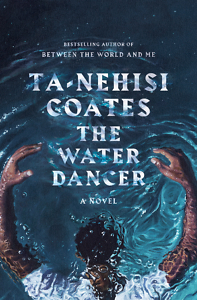Memory is the Chariot
Ta-Nehisi Coates turns his talents toward fiction in a powerful debut novel
The opening scene of Ta-Nehisi Coates’ debut novel, The Water Dancer, focuses on the image of a bridge in Virginia — a place the book’s narrator, Hiram Walker, has no wish to remember. That bridge, which crosses the powerful Goose River, is the portal through which every slave from Lockless Plantation who has been sold off, gone “Natchez-way,” must travel. In his youth, Hiram watched countless souls cross that bridge, including his mother.

When he decides to tell his story many years later, Hiram knows he must yield to the demands and complexities of memory, “how it can open a blue door from one world to another, from mountains to meadows, from green woods to fields caked in snow.” Hiram reveals that, just as “memory can fold the land like cloth,” as a young boy he plunged the memory of his mother “into the ‘down there’ of my mind.”
As the novel shifts into the past, we learn that young Hiram has a singular gift for memory: photographic recall of everything he encounters. Despite this prodigious memory, however, there is what he calls “a gash where my mother should be.”
Hiram’s father, on the other hand, can never be forgotten — he is the owner of Lockless Plantation. Howell Walker chooses Hiram to serve in the household, tending to Hiram’s dissolute white brother Maynard. Howell and Maynard may hold power in the grand ecosystem of Virginia, but as people, they are helpless, rudderless. With tunnels and dumbwaiters that keep the house slaves’ constant toil concealed from view, the Lockless mansion is an emblem for the falsity of their world, built as “an entire apparatus to disguise this weakness, to hide how prostrate they truly were.”
Running from Lockless has always felt impossible to pull off. But early in the novel, Hiram crashes a carriage off the Goose River bridge and into the freezing current — a disaster that almost kills Hiram and does kill Maynard. Hiram’s position at Lockless then grows more tenuous. He could be sold any day. When that time comes, “running is not a thought, not even as a dream, but a need, no different than the need to flee a burning house.”
 After a harrowing escape, Hiram is initiated into the world of the Underground, agents working in secret against slavery. Their methods are “covert, mystical, violent,” and Hiram learns right away that freedom will not simplify his life in the ways he’d imagined. Discussing the cost of the Underground life, a pivotal figure in Hiram’s future argues that “freedom, true freedom, is a master too, you see — one more dogged, more constant, than any ragged slave-driver.”
After a harrowing escape, Hiram is initiated into the world of the Underground, agents working in secret against slavery. Their methods are “covert, mystical, violent,” and Hiram learns right away that freedom will not simplify his life in the ways he’d imagined. Discussing the cost of the Underground life, a pivotal figure in Hiram’s future argues that “freedom, true freedom, is a master too, you see — one more dogged, more constant, than any ragged slave-driver.”
Hiram’s role among the Underground involves an enigmatic power called Conduction, which Hiram possesses but cannot control. Stories of how others have wielded Conduction to set people free place pressure on Hiram to develop this gift and use it in service to the resistance. Hiram doesn’t understand his ability, but he senses that its power is rooted in memory. One legendary practitioner tells him that “memory is the chariot, and memory is the way, and memory is the bridge” that he must take to find real freedom, which includes working to free others.
Coates has built a formidable record as a journalist and essayist, and his previous books include the National Book Award-winning Between the World and Me (2015) and an essay collection, We Were Eight Years in Power (2018). His 2014 article “The Case for Reparations,” a stirring, meticulously reasoned argument for compensating African Americans for slavery and racist oppression, prompted responses from media outlets across the country. Coates has also written for Marvel Comics, penning issues of Black Panther and Captain America.
His particular body of work has paved the way for The Water Dancer in specific, fascinating ways. Coates clearly researched the book’s places and times in abundant detail, but this novel wears its historical setting with effortless grace. Its characters’ sorrows and longings surge through the confines of their era, feeling urgent and contemporary.
Hiram’s mysterious superpower is woven subtly into the fabric of his inner world. Scenes that stretch beyond realism are few, and they never falter. Instead, these scenes surprise, opening the novel into spaces fueled by wonder and revelation.
The Water Dancer unfolds with seamless lyricism and masterful narrative pacing. As a result, its 400 pages fly by all too quickly. With great heart and a skilled sense of mystery, Coates creates a heartbreaking but luminous world that’s difficult to leave.

Emily Choate holds an M.F.A. from Sarah Lawrence College and is the Fiction Editor of Peauxdunque Review. Her fiction and nonfiction have been appeared in Shenandoah, The Florida Review, Tupelo Quarterly, Yemassee, Late Night Library, and elsewhere. She lives near Nashville, where she’s working on a novel.


